|
Project Report
Project Title:
Development and
Implementation of Innovative Methods of Teaching Maths, Science and
languages in the Multicultural European Classroom to Increase Student
Literacy and Prevent Early School Leaving.
The aim
Of the project was:
Exploration of teaching tools and social innovations that will support
low achievers,immigrants and multiculturalism in the European classroom
and prevent early school leaving.
Objectives of the
project:
• To investigate the
ethnic composition, students learning success of partner schools in
Portugal, Cyprus,Germany, Iceland, Croatia and Latvia and the
problems/difficulties that lead immigrants, Roma and other low achievers
to early school leaving
• To develop,
implement and share innovative methods
• To encourage
students to view language literacy as being useful to all citizens and
thus enhance literacy and increase the number of students who acquire
compulsory education successfully.
• To elaborate ICT
learning and teaching tools : CD - ROMs with virtual excursions, GPRS
maps, mobile phone applications for Maths, Science and language lessons
The teachers from
six participating countries Portugal, Croatia, Iceland, Germany, Cyprus
and Latvia participated in the project. The participating schools were
represented by teachers of Maths,Science and languages (Germany,
Cyprus),Science, History (Iceland,Croatia,Portugal), foreign and
schooling languages (Latvia) .Through this project participants
motivated students to finish school successfully, enhanced their
motivation,tolerance and inter - cultural competences.
The reason why
schools decided to participate in this project is that the staff of the
schools every day deals with the issue of integration of children from
immigrants' and Roma families into school society and their low
achievements. The project deals with the common problem : a lack of
motivation, low achievements and as a result early school leaving.
We started this
project with the question why it happened.First, the Project
participants held studies at their schools, which helped to understand
the reasons of such situations and their concequences .They did
researches on their country’s history - and learnt why and where
from the migrants came . Also the ethnical composition of schools was
studied and student problems were definided and the ways to overcome
them were tried to be found.
Using the innovative
teaching strategies helped to increase the number of students who
successfully finished school and continued education at tertiary
level.Finally all participant schools did not have any early leaving or
unsuccessful student from target groups.
Short description of
the results :
The outputs
-
-
real
examples of lessons, other activities plans, adaptable to different
learning environments,
tailored to the needs of different target audiences (teachers,parents,
decision makers, learners)
-
key
findings from five researches/studies
-
Video
presentations
-
Multicultural
activities( history and culture of participating immigrant students
through dances, music and food and language awareness of the spoken
languages through quizzes and role plays)
-
ICT
tools - virtual excursions, learning applications for mobile
phones and other
Important outcomes
expected in this project include the availability of lesson plans and
resources for other teachers and increasing teachers professional
competences.
The pedagogical
staff of participating schools implemented, improved the resources in
their everyday practice, disseminated among the colleagues. We believe
it is crucially important to work in that direction because it
encourages improvement of personal,professional and social competences
of all participants.
During the project
schools developed and introduced new learning methods that facilitated
the students' ability to demonstrate their skills and knowledge,
promoted learning motivation improvement and helped students
successfully complete school.
Project provided
such activities as teacher exchanges and seminars, developing and
approbation of lesson plans, studies, videoconferences, web cam on -
line brodcasts from training to deseminate the tesults,short term
trainings and creation of ICT tools.
-
Project
Website:
www.erasmus.pdps.lv
(at the moment more than 2050 unique
visitors), where everyone can find all outputs of the project, such
as:
-
New
methodologies/techniques (including in the ICT area)
-
Training materials
-
Reports/Newsletters
from training sessions
-
Photos and videos
-
Studies /reseaches
-
Press articles
-
Training
programme
The
main outcomes
of the project:
-
Exchange
of ideas and good practices
-
Experience
gained by individuals
-
Establishment
of networks/ partnerships
-
Knowledge of
teaching migrant students was shared and in all participant
countries teachers know how to deal with it
-
New better
ICT, English language and teaching skills were aquired by the
participants
-
Cross -
cultural dialogue and discussions about
Speaking about
sustainbility of the Project, we can claim that through research and
observation of different syllabus from different participating
countries, one can get idejas and experience for designing better
curricula for his country.
Therefore,
firstly,we are going to keep in touch with the project participants in
future. Secondly, we are going to add the priority of the project to the
school vision and change our teachers' syllabuses including new
approaches, project resources and outputs aiming to bring
multiculturalism in the classrooms and supporting low achievers and of
course to implement them in everyday teaching practice . The pedagogical
staff of participating schools intends to implement, improve the
resources in their everyday practice, disseminate among the colleagues.
For this purose a web cam translation of the workshops for teachers and
authorities of the city of Riga was held on the basis of Riga Pardaugava
school devoted to the outcomes of the project.
We believe it is
crucially important to work in that direction because it encourages
improvement of personal,professional and social competences of all
participants . Furthermore, we believe that in future the society will
be morevethnically diverted and we have to be ready to face and deal
with new problems.
Furthermore,
eTwinning platform was used to support the sustainability of the project
: the information about the project, project portfolio.
Project Management
How
satisfactorily is the ensemble of project partners contributing to the
realisation of the project? Have the distribution of tasks been adjusted
since the application?
Has any change in
the composition of partners been deemed necessary (as already
communicated to the NA), or is any change planned at this stage?
Besides the
project management activities already described, what other activities
have you carried out using the budget awarded for Project Management and
Implementation?
We consider that
Strategic Partnerships should involve the most appropriate and diverse
range of partners in order to benefit from their different experiences,
profiles and specific expertise and to produce relevant and high quality
project results.
The participating
schools of the project were:
Riga Pardaugava
School (Latvia)
StädtischeAdolf -
Reichwein - Gesamtschule (Germany);
Gymnasio
Palouriotisisas (Cyprus);
Agrupamento
Escola de Gala Nascente (Portugal);
Osnovna škola
Marjan (Croatia);
Grunnskólinn á
Îsafirði (Iceland)
The Project had the
unique composition of participants - three participant
schools are located in the political/cultural centers of their countries
- Riga, Nicosia and Split. The other three schools represent the unique
small town /villages environments .The schools in Portugal and
Iceland are located
in the remote corners of Europe, therefore, the participating in the
international projects is especially important for them in the sense of
the European dimension.
- Two
organisations have never been involved in a similar project,
furthermore, the only one has participated in Erasmus+,therefore, most
of schools are newcomers and gained the valuable experience of
international cooperation.
- The selected
partners had similar problems in their schools and were searching for
the best ways to solve them. All partners are active, willing to work
and have common areas of interest simultaneously having a variety of
approaches to teaching. The common areas of interest are
multilingualism, multiculturalism, low achievement and early school
leaving.
- Latvia was
the coordinator country. The coordinator provided ready documents' flow
to the partners. The Latvian partner was responsible for the designing,
broadcasting and updating of the web site of the project.
During the project
all participants had definite tasks. Some tasks were obligatory for each
participant country : research on ethnic composition of schools, the
research and input into the countries history and presenting education
system of countries.
The second part of
tasks was the choice of participants. They chose and methods according
to their interests and possibilities,considering the aim and objectives
of the project.
During the two years
Project team strictly fullfilled the plan and did following activities:
Each partner was
responsible for evaluating of the questionnaire results on their own .
Portugal prepared
the initial questionnaire that was applied to find out the ethnic
composition and problems of the
immigrants in the
participant countries
All countries did
Research/study on ethnic composition of schools and problems of
immigrant
Different learner
- centred, research and problem solving techniques were undertaken
and evaluated - all countries did
that
Once the
lessons and other activities were planned, they were conducted in the
participating countries, (if it was possible,they were videotaped ),and
evaluated for their instructional effectiveness - all countries
Networking
with educational specialists from universities, public organisations in
Latvia and other participant countries were also being encouraged for
intellectual support of the project gate - Latvia,
Germany,Cyprus, Iceland did that.
Feedback was
exchanged between participating schools to improve the quality of the
output. They informed the school about their findings by presenting
brief descriptions using school magazine, web page and the notice
boards.
The German
partner was responsible for preparation of the follow - up
questionnaire.
All
participant countries took part in the Project
"Chemistry through music".
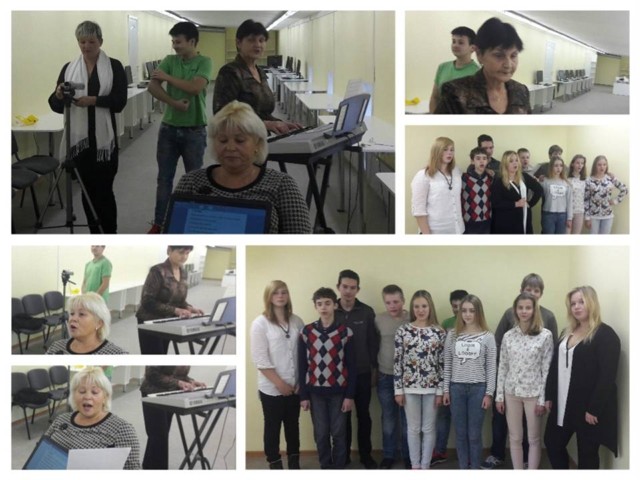
Thus, a multilingval almanach of poems about chemical elements was
created
One of the
outputs of the project was a newsletter. A standardized format, which
partners from Cyprus developed for all participants, was used for the
newsletter .Each school had a duty to write the articles for the
newsletters and give the feedback.
Each
school was responsible for organizing the meetings and cultural
activities, helping the partners find suitable accommodations and
transportation within the local area and giving the other partners a
chance to learn about the country and culture they are visiting.
Partners, who hosted the project participants, prepared a reception with
a great sense of responsibility, and exchange of experience takes place
in a friendly atmosphere.
Thus, each partner
was responsible for contribution and had equal responsibility in
planning, initiating and implementation of the
The project group
was characterized by such qualities as high degree of professionalism,
initiative, sense of responsibility and friendly relations. There were
not any changes among the Project partners and there were no any reason
to introduce them.
In general, the
two years of the project took place in a friendly and creative
atmosphere.
We believe that
cooperation was successful - the tasks of the project had
been completed creatively and according to the plan.
Which activities and
indicators of achievement (quantitative and qualitative) did you put in
place in order to assess whether and to what extent did the project
reach its objectives and results? How did you measure the level of
success?
The students' scores
and assessment achievement were checked for each country by doing pre -
tests, post - tests, analyses of learning results at the beginning and
the end of the project. The pupils involving in the project were asked
to fill in an initial -
questionnaire
through which their motivation was monitored. During the project period
there a follow - up questionnaire as well. Some schools (Latvia)
participated in PISA evaluation,where also students from target group
(romas) participated.
The results showed
us that the aims of the partnership had been met and the expected impact
had been achieved.
-
Quantity analyses - how many people participated, how active they
were - the statistics of the project - contact people are
responsible
The quantative
results
of the Project:
|
Indicator |
Croatia |
Portugal |
Cyprus |
Iceland |
Germany |
Latvia |
TTO
TOTAL |
|
the number of teachers
involved in the project activities, actively and indirectly |
25 |
12 |
10 |
21 |
15 |
45
|
128 |
|
the number of students
involved in the project activities, actively and indirectly |
250 |
140 |
200 |
146 |
220 |
220 |
1156 |
|
the number of people
(outside the schools) attended some activities of the project |
130 |
120 |
15 |
7 |
2 |
100 |
374 |
|
the number of extra lesson
plans/project works (prepared by various course teachers) |
30 |
25 |
8 |
12 |
4 |
30 |
109 |
|
the number of the created
tools (educational outputs) |
4 |
4 |
2 |
4 |
3 |
4 |
21 |
|
the number of seminars/web
conferences about the project for teachers |
4 |
3 |
2 |
5 |
4 |
5 |
23 |
|
the number of publications
in mass media(newspapers, Internet) |
3 |
3 |
2 |
4 |
9 |
3 |
24 |
|
the number of radio and TV
programms devoted to the project |
1 |
4 |
0 |
0 |
0 |
3 |
8 |
|
the number of articles for
the newsletter issues |
1 |
1 |
1 |
1 |
1 |
1 |
5 |
|
the number of
researches/surveys done during the project |
4 |
4 |
2 |
3 |
2 |
5 |
20 |
How were the
quality, effectiveness and efficiency of the project monitored and
evaluated (include budget control and time management)? Please mention
the involved staff profiles and frequency of such activities
The quality of the
project was assessed:
- by analyses
of the questionnaires for participants, which were implemented after
each transnational meeting and in the end of the project
- by analyses
of the questionnaires for students, before and after each implemented
activity
- all
the results were discussed e during transnational meeting
During
transnational meetings discussions were done to find out whether there
are any halting points or not.
During each
meeting participants of the project were reminded the objectives and
tasks and were addressed to the project activities in the plan and the
implementation of the tasks and progress according to plan was
monitored.
Futhermore the
discussions ater each country’s presentation were held -
participants expressed their opinion about the usefullnes of the
methods, possibibility to implement in their country
After each
meeting, the evaluation took place - after Portugal and
Germany visits the participants filled in a questionnaire online, but
after Croatia,Cyprus, Iceland – in a free form expressed their views
with the help of e - mails.
From the
information obtained, we can conclude that the project went according to
plan, the tasks were regularly carried out with enthusiasm at a high
level.
All our finances
were under control of the independent financial structure, we wrote our
reports on the completed activities.On the place, school heads take all
funds under control. Headmasters/mistresses in most cases had the
overall economic responsibility for implementation of the project.
If relevant, please
describe any difficulties you have encountered in managing the
implementation of the project and how you and your partners handled
them. What measures were used to handle project risks (e.g. conflict
resolution processes, etc.)?
Actually we
prevented such situations at the preparatory stage - all participants
have presented themselves and good relationships were established
through common work on the project ideas. The preparation stage showed
that the participants were very punctual and hardworking people and we
had no any conflict situations during the two years
5. Implementation
this section asks
for information about all the stages of the project: implementation of
main activities including practical arrangements, participants' profile,
impact, dissemination of the results and future plans;
Please describe the
activities organised by your project and elaborate on the methodology
you applied. Please provide detailed information in particular about the
project activities that were supported by the grant for Project
Management and Implementation
How did the project
partners contribute to the project? Please detail specific
competences brought in by
the partner organisations.
The participation of
different organisations from six countries provides genuine added value
to the project due their specificē skills.
- For example,
the Cyprus school teachers have special programmes for the newcomers
where they offer support in Greek and Maths and use different approaches
and extra curricular activities for students such as competitions, music
events, theatre, art,voluntarism, visits to museums and other places of
interest, therefore encourage immigrant s'students to be active members
of their school community
- The
Portuguese school brings multilingualism and multiculturalism in their
school through the European Club activities and using ICT.
- The German
school has got the following experience: lessons in a new subject called
“language”,
where the teachers try to enhance the linguistic competence in the
German language of younger German and multicultural students, who often
have difficulties in understanding texts/producing texts
The other
participating countries also have their unique experience, which they
shared.
- The school
from Iceland has a method to decrease early school leaving by working
with the community. Students in danger of dropout get to work one day a
week for a company they find interesting, for example: building society,
play schools and grocery stores. They have changed teaching methods and
use IT programs giving more opportunity to work with schools around
Europe in diverse ways.
- The teachers
from Latvia school raise students tolerance, motivation and literacy
through the special kinds of reading activities and literary tourism and
using information technologies to increase students' motivation.
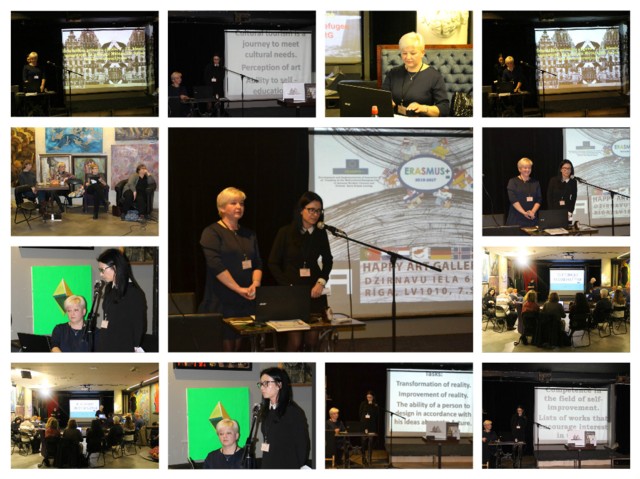 
We think that the
synergy of different experience and methods enriched each participating
school staff and promoted the European dimension.
This project
combined Maths, Science and languages and deals not only with lessons
but with outclass activities, social innovations and ICT as well. In
particular, through this project we fostered multidisciplinary and
inter - disciplinary approaches;integrate the teaching of basic skills
(Maths, Science and literacy); promote problem - based learning and
fostered innovative approaches to teaching technology, aiming to prevent
low achievements and early school leaving .
The uniqueness of
the project is that it includes 5 surveys, which will give the
participants a possibility better understand the reasons and roots of
the problems their scientific justification and the way where to go.
Everything our big
team did, was much more that it was written in the application. All
project participants turned the written words of it into interesting,
useful activities, that changed the lives of many students, teachers and
their schools.
What is your
qualitative appreciation about the cooperation and communication between
the partners and with other relevant stakeholders during the
implementation of this project? What are the positive and negative
elements of this cooperation process? What are the elements you would
improve if you were to carry out a similar project in the
future?
Connecting with the
partners during the project contributed to social cohesion.
Coming together with
different cultures both abroad and at home improved intercultural
dialogue and active citizenship.
We realised that
active citizenship,overcomed prejudices by cultural dialogue and
awareness of equality contributed to personal fulfillment.
During the process
of the project six meetings fulfilled a face to face communication.
Several meetings
with stakeholders: Parents Council, Student Council and
methodic section leaders
were undertaken.
What target groups
were addressed in your activities plan? Were the target groups changed
in comparison to the ones identified in the application form?
The main project
beneficiaries are teachers, students of the participating schools,
participant organisations, the education systems of the countries
Teachers:
We consider this
project was a kind of a teacher training for them, thus teachers
improved their competences, gained new methods, know - how tools for
everyday work
- with the
help of our project we improved the speaking skills of our staff in a
foreign language and many of them got the motivation for learning a
foreign language
Our
institutions
:
-
provide the education on higher level and in better quality
Students:
- We believe
that broadmindedness of the educational staff against difference
directly affects the broadmindedness of young people,the
multiculturalism and multilingualism became everyday practice in the
classrooms .
Our schools needs
incorporated better European qualities in all aspects of our lives. We
strongly
believe that by this
project students and teachers will be much more motivated to learn
foreign languages and increase their knowledge about other cultures
- The learning
motivation, achievements increased, but number of those students who
dropped out off school decrease
The communication
with target groups was via:
-
attending
workshops, seminars, sharing experience
-
familiarization with project resources via leaflets, newsletters
-
answering
questionnaires, participating in researches
-
familiarization with the project resources, videos, photos via the
Internet
-
giving
expertise of the Project
-
being
trainers for express in - service training
-
help in
preparing videos, ICT tools and other resources, translations
5.2. Transnational
Project Meetings
Please describe the
Transnational Project Meetings organised within your project. What was
the purpose and frequency of the transnational project meetings and who
participated? Please elaborate how these meetings served the purpose of
project coordination and implementation and in case there is a
difference between what was planned and what was implemented, please
explain why.
All transnational
meetings were held according to the initial plan: in 2015./2016. three
transnational meetings were held - in Portugal, Germany and
Croatia.
In 2016/2017
school year we had two transnational meetings in Cyprus and Iceland and
one short - term training event in Riga (Latvia)
Overall, speaking
about the meetings, it is worth to highlight, that their aim was not
only to coordinate the gate of the project.Actually, each project
meeting was like a short - term learning - teaching event with wide
sharing of experience, a lot of presentations of completed work and
discussions.A big part of school society in each country - teachers,
students, parents, were involved in organisation of the meetings and
participated in them. In all countries participants were acquainted
with the practical work which is carried out with refugees and migrants
at schools, how the integration of pupils is carried out at school, in
the community.
In Portugal,
Germany, Cyprus, Latvia and Iceland the project participants were met at
municipality level by the Mayors of the cities, which proved the
importance of the project for the community.
However the
travelling of only two people from each country was funded by, the
schools often found the opportunity to send from three to five teachers
to each meeting - they were coordinators, headmasters,
ITspecialists and teachers who actively participated in studies,
elaborating of teaching tools.
Stage 1 -
September - October 2015.
Aim:
To get acquainted with the educational system in Germany, Iceland,
Portugal, Croatia, Cyprus and Latvia, to compare the curricula and
standards of subjects.
Project
participants prepared presentations. At the transnational meeting in
October (22.10 - 24.10.15) they were presented (national education
standards, pupils' learning organization, school environment), it was
obtained information on education systems in partner countries,
discussed the differences and similarities of national education systems
. Topic and the terms on which will continue to be worked on, were
designed. The meeting also defined future strategies and terms. All
partner schools have been given the task - to make study on
students' national composition of students and migrant problem studies
(up to February) and to conduct creative projects on the history of
their country. Project participants had also to set up profiles of e -
Twinning and Google.
During the
meeting the project participants closer acquainted with Agrupamento
Escola de Gala Nascente, Vila Nova de Gaia (Portugal), classrooms,
laboratories, libraries, educational work at school, with teachers and
support staff
The results of
the visit:
A big sharing
of experience and Exchange of practices on the international platform
was held
New teaching
tools were developed, piloted wit pupils from target group
The staff was
acquinted with the work with migrants in real situation
The
multicultural idejas and feeling of belonging to Europe family were
strenghened
Teachers
noted the interesting approach to working with pupils from socially
disadvantaged families and children with special needs,
The staff
were acqainted
with the Portuguese history, culture and traditions,
expanding their horizons;
set
up contacts with foreign teachers and improved their English language
skills.
Participants of
the project were invited to Vila Nova de Gaia town hall, where the mayor
noted the importance of the project both at the city and state level.
It was
established an on - line questionnaire for participants of the meeting
to assess its progress and results.
Latvian team has
created a site where are placed the working materials, meetings,
presentations and other information:
http://erasmus.pdps.lv
Stage 2. November
2015 - March 2016.
The aim:
During
this period, the school were studying their school ethnic composition,
as well as being conscious of migrant families, the number of children,
are compared and analyzed the progress in comparison with the rest of
the class students progress in the identified learning problems.
During
this period Project partner school teachers also worked with children
on research, "My country's history sad and glorious pages."
The results of
the visit:
A big sharing
of experience and Exchange of practices on the international platform
was held
The staff was
acquainted with the work with migrants in real situation
The
multicultural idejas and feeling of belonging to Europe family were
strenghened
The
analyses of the results "School ethnic composition", "Pupils –
migrants: learning, progress and challenges", "My country's history sad
and glorious pages."were presented at the transnational meeting in
Germany 14.03. - 18.03.2016.
German
teachers shared their rich experience in the integration of migrants
- the school has developed a system - two special
classes for migrant children In Germany
The
project participants were invited to the Lüdenscheid town hall.The
mayor of the town proved the importance of the project topic for the
community
Stage 3 -
from April to May.
Aims:
During
this time, participants of the project conducted research and presented
results on the topics: "What is happening in my country right now
- the reasons for emigration and immigration. How is the
integration of migrant pupils held? "
Project
participants also prepared methodological tools for the work with
children - migrants.
During the
meeting, Croatia 18. - 20.05.2016. Participants presented practically
applied - lessons, social innovations and approaches as well
as innovative technologies, which are used in schools to facilitate the
ability of students - migrants to acquire knowledge and
skills, promote learning and motivation to build a positive attitude
towards a multicultural environment in European schools.

 Riga Pardaugava
Elementary School presented the computer science program
"Diverse Riga"
(Many Faces of Riga) - in Latvian, Russian, German, English Riga Pardaugava
Elementary School presented the computer science program
"Diverse Riga"
(Many Faces of Riga) - in Latvian, Russian, German, English
Program,
Presentation
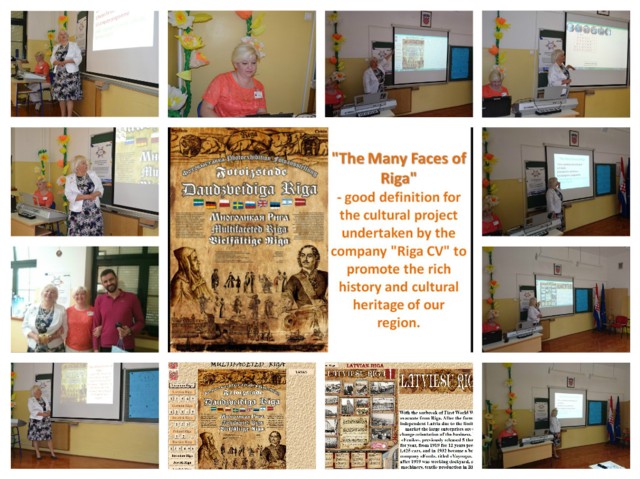
The results of
the visit:
A big sharing
of experience and Exchange of practices on the international platform
was held
New teaching
tools were developed, piloted with pupils from target group
The
multicultural idejas and feeling of belonging to Europe family were
strenghened
Stage 4.In
October 24 - 26 the fourth meeting in Cyprus was held.
The aim:
The two major
topics
of the presentations of all the participating partners were:
1. Presenting of a
teaching tool aimed to achieve the goals of the project
2.Results of
piloting of the project Chemistry Through Music
The participants
took part in active discussions after each presentation and a written
feedback from all partners was also given to each team.
We visited
Palouriotissa Gymnasium - the Lower Secondary School in the
center of Nicosia.
We attended a lesson
where immigrants and refugees were taught, there were two Russian -
speaking boys: one - from Russia, another one - from
Ukraine. They liked their school very much, but the Greek Language is
quite difficult for them to learn, despite of the teachers’ support
We noticed that the
authority of the school and the main staff encourage students to become
the active members of Europe - an Society having a pride of being
persons of Greek origin
All the
presentations can be found on
http://erasmus.pdps.lv/_private/text/cyprus4.htm

Cyprus
presented
” Innovating Method of teaching Greek Literature” .A drama method was
used by poet Eleni Vakalo . The goals of the presented lesson were to
give students the opportunity to:
Achieve drama
skills through literature.
Familiarize
with social problems and how to approach universal values.
Express their
feelings and connect them through the literary text they will read.
Express their
feelings, reactions and interpretations before, during and after the
reading of the poem

The participants
from Iceland
showed us part of their work on Icelandic literature and
literary tourism.
The goal of the work
is to introduce various kinds of Icelandic literature to other kids of
the same age.
Where are
they originated, in which situation do they happen.
What affects
Icelandic litertature: weather, landscape, geographical situation,
economy

Latvia
presented
a multimedia guide in mathematics for pupils in grades 1 - 4 “Vadim is
learning mathematics at elementary school". The tool has been
developed for drilling and testing the mathematical skills and the
development of logical thinking for children who have problems in
understanding and assimilation of the material, children with low level
of development or students taught in a foreign language.
“Vadim is
learning mathematics at elementary school"
-
computer
progr.,
present.
(T. Moisejeva, Y.
Chernakova, L. Bizune, L. Lazareva)
 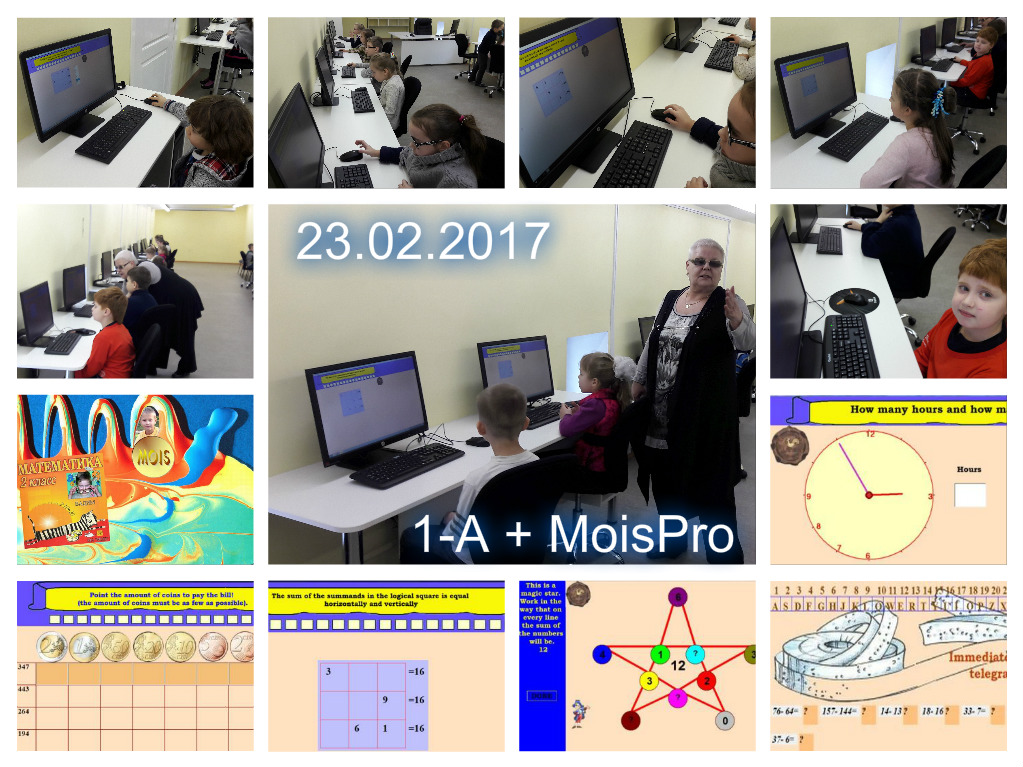
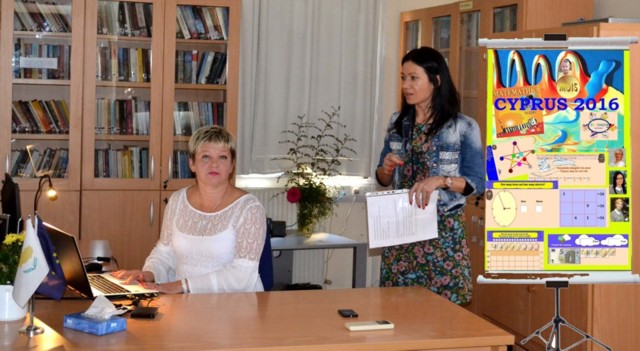

Germany
presented the approach ”Teaching language” which means the teaching the
German langauge plus the fundamentals of organising a student’s basic
working skills to all students in a two - years course. The years five
and six take part in it, so a language oand oranisational base is set
for the years to come. All other subjects are to profit from it.

Croatia
prepared
two presentations:
”The project of making traditional
cap of people of Split”
and another project
“The dowry of our grandmothers”. The objectives of the projects were to
develop awareness about preservation of cultural heritage, to encourage
entrepreneurial spirit and creativity. These both cross curricula
projects involved integration of many subjects and skills: Croatian
language, history, literature, mathematics, physical education,
handicraft.

Portugal
held the
research “Have the new technologies an impact on mobility and
integration?“.The survey on usefullness of GPS in everyday life was held
among twenty - nine 11 - 13 year students from the Europran Club,
including those with migrant background .These students were involved in
practical activity with the task to find different 3 different objects
with the GPS help.
The project
participants also took part in piloting of the Portuguese Project
"Chemistry for
Music".
This cross
curricula project has such objectives as:
Teach
chemistry through music as an innovating teaching method.
Motivate
students to complete their education successfully.
Develop
cooperative and collaborative practices and this way is related to the
topic of our main project.
That is why our team
decided to undertake a piloting of it. Four countries presented the re -
sults:Latvia, Portugal, Iceland and Cyprus. It is worth to mention that
at each school the initial procedure, offered by Portugal was adopted
according to students abilities and more teachers’ help was provided
The results of
the visit:
A big sharing
of experience and Exchange of practices on the international platform
was held
New teaching
tools were developed, piloted wit pupils from target group
The staff was
acquainted with the work with migrants in real situation
The
multicultural idejas and feeling of belonging to Europe family were
strenghened
Stage5.In April
2017th the planned five - day training for teachers took place in in
Riga.
Stage6.The aim:
to prepare
articles for the final report.
to analyse the
gate of the project
The last meeting
in Iceland in May 16 - 18 was devoted to the analyses of the the results
of the project and final reports.All participants described their
participation and the way of achieving project goals in their schools.
The Icelandic
school
has a method to decrease early school leaving by working with the
community. Students in danger of dropout get to work one day a week for
a company they find interesting, for example: building society, play
schools and grocery stores.
The change in
teaching methods and more use of IT programs give them more opportunity
to work with schools around Europe in diverse ways. Using an App we made
a quiz about all the countries of the project and some particularities
we‘ve leant during the meetings.
The guests were
acquinted with a fab lab (fabrication laboratory) - a small
- scale workshop offering (personal) digital fabrication. A fab lab is
generally equipped with an array of flexible computer - controlled tools
that cover several different length scales and various materials, with
the aim to make "almost anything".
5.5.
Learning/Teaching/Training Activities
Please describe the
short - term learning, teaching or training activities included in your
project and explain how they have contributed to the project's
objectives. In case there is a difference between what was planned and
what was implemented, please explain why
In 2017
Erasmus +
project participants, 14 teachers and directors from five countries
visited Riga from April 2 to 8, and took part in a 5 - day training
program organized at Riga Pardaugava Elementary School. The training was
organized in accordance with the theme of the project "Development and
Implementation of Innovative Methods of Teaching in the Multicultural
European Classroom to Increase Student Literacy and Prevent Early School
Leaving". The project involves Germany, Portugal, Iceland, Croatia,
Cyprus and Latvia.
This
short - term joint staff training event was aimed:
-
to
strengthen the cooperation between the participants involved in the
project
-
to gain
new perspectives regarding to the theme of the project
-
to give
the staff the opportunity to exchange views on teaching content, to
share their experience,the results of researches, piloting
activities
-
to
disseminate the participants innovations in face - to - face
situation
-
to
provide training in using new ICT tools and innovative methods,
aiming to develop students' interest and motivation
-
to enable
teachers to work together in multinational and multidisciplinary
groups and so benefit from special learning and teaching conditions
not available in a single institution
There were some
changes in the program,comparing with the initial program in the
application, because some topics such as “Presentations
of the results of research of participant countries: What is happening
in my country nowadays? - Who is coming to my country? / Who is
going to live to other countries? - Are the
communities seriously integrated? / How is it achieved?”
were undertaken,
discussed during the transnational meeting in Croatia. Another change -
the research “Input
into the history and ethnic composition of the participant countries and
how the
integration of the society was achieved”
was held in Germany
The lecture of
Professor of the University of Latvia: Enhancing students' tolerance via
literary tourism –
this topic was discovered by presentation of Riga Pardaugava school, but
the invited lecturer was representative specialist from the Agency of
Latvian Language Erika Pichukane - we considered that for participants
it would very useful to know how we deal with teaching refugees from the
person who has real experience.
The training program
was extensive, it included training, exchange of experience, visits to
various institutions, study tours, open lessons and workshops.
For three days, teachers learned new skills in ICT - to develop
training applications for a mobile phone.
Express in - service
training: During the week participants had three lessons from a ICT -
specialist from Bishumuizha Technical Center. First, he held a small
lecture about mobile phones and the possibilities that arose when the
smartphones arrived on the market and the difference between
applications (apps) and web site. Then the staff learned about the
Siberian that is a platform for building apps. Participants got hands on
experience in uploading files, pictures and quizzes on the app. Each
country got a special task to work on in the tour around the city. All
instructions were printed out in special program book so participants
could follow them when get home and want to keep on experimenting. In
the last class every team got access to an app that had been prepared
for us and registered it on google play so now everyone has an app up
and running.
Project participants
were also invited to the Bišumuiža New Engineering Center where the
excursion was conducted and sharing experience about involving students
in out school activities was held, and the participants had an
opportunity to participate in the ceramics and glass painting workshop
On the first day Riga Pardaugava Elementary School teachers together
with students conducted more than 10 open mini - lessons,and on
Wednesday three big open masterclasses were given to guests, showing the
work system in live mode.
On our third day in
Riga participants had a visit from a representative of the Agency of
Latvian Language Erica Pichukane who works with refugees and she told
about how the city plans their coming to the country and guides them
into the community
A great exchange of experience took place on April 6 in the Happy Art
Museum - there was a direct web broadcasting of the webcams
and anyone was able to appreciate the presentations of participants from
all countries. The main theme of presentations was working methods with
pupils with learning difficulties.
Each country prepared a 60 - minute workshop for the participants. After
each workshop a wide discussion was held about pluses and minuses of the
method and the ways of implemetation it in other countries.
Icelandic team
showed the group few of the applications they use the most in school.
The applications are Nearpod, Keynote, Showbie, Google classroom,
Kahoot, Math and cheese and some more. The school uses only free
application.They also talked about the way they use the application
Bitsboard for teaching icelandic as a second language. Iceland showed a
video where a young student is practising his first words in icelandic
through the application and how useful the application is when a student
does´nt know how to read and write in the latin alphabet
Germany team
explained how and their school has been dealing with a increased number
of students which are refugees. Some of those students come to Germany
all by themselves and without parents and live in an SOS children
village. Many of these kids are traumatized and have some heavy
experience in their past.
In the second part
Germany talked about the development of German as a second language and
how differently students use is through the daily routine. The language
has many fields and children have to learn what language is appropriate
in each activity. The ideas of “scaffolding” the language based
challenges in all subjects was introduced.
Portuguese team held
a lecture where she showed the group how they have been working with
modern technology in their school. They introduced a project about the
human body their students worked on using ICT tools, the project was
very successful.After working with this new computer technology Maria
and Nair made a small survey where they used to program Webquest. The
students were asked how they felt about this new approach. A majority of
the students really enjoyed it and wanted to use this technique more
often. It approved to them that the project was a nice success.
The Cyprus team told
that
the number of immigrants in Cyprus has increased rapidly and teachers
there, like in much of Europe, must adjust to meet the needs of children
of various nationalities. The aim of the Project, the had ellaborated,
is to give the students a chance to learn Greek, increase their Greek
vocabulary and use the language and culture of their nation. The
students who took part in the project come from 8 different countries.
They were divided into groups according to nationality and then they
chose fairy tales, folk tales, poems in their mother tongue and
translated it, first into English and then into Greek with the help of
their teacher. The students acted, sang and then dubbed their acts. The
acts were then recorded and shown to each group‘s class. The students
were excited to be able to present fairy tales from their own country
and felt that what they were doing mattered because they had a chance to
use their own language and learn the language of others. With this sort
of project, immigrant students can learn Greek in an enjoyable way and
their Greek vocabulary and proficiency is increasing.
Croatian team spoke
about Integration via Science lessons (national heritage, tourism,
nature).
In Split and Salona
there are a lot of historical artifacts and ruins, up to 2000 years old
and the area is a UNESCO World Heritage Site.
The project aims to
combine natural and cultural heritage. Students were taught about
religion, religious symbols and sites in Salona and stories about
Christian martyrs, Roman gods and culture.
The students went on
a field trip to Salona and explored the area and the artifacts that can
be seen there. They received a visit to the school, went to museums and
worked on various projects. Finally the students utilized all they had
learned to create social games.
The Latvian team
told us about a Project on literary tourism they made about famous
Latvian poet Janis Rainis. The students visited his house and read poems
at his favorite places and filmed it. This is a part of a bigger project
about historical and cultural education and breaking up the pace of
everyday classroom.
Guests were received
by the Riga City Council, visited the Riga Cathedral concert and were
surprised by the beauty of Riga and Jurmala during excursions.
The program of the
training:
Day 1
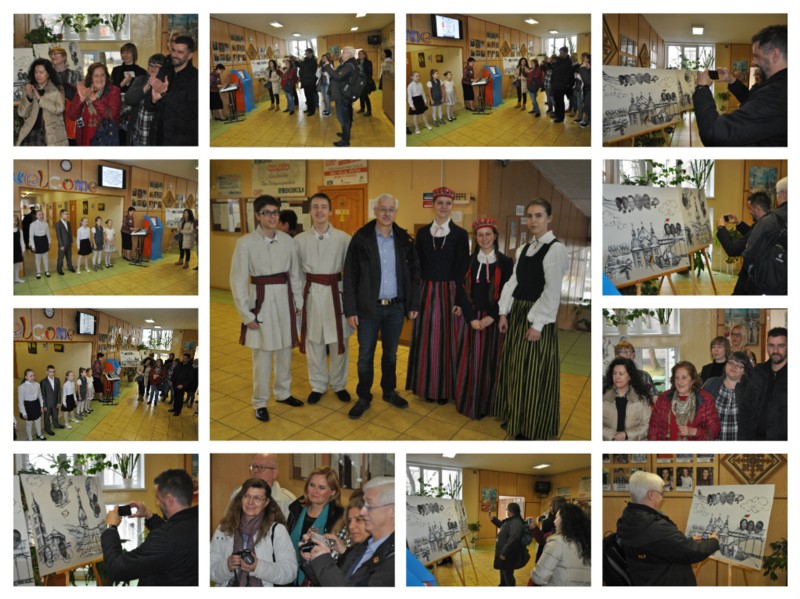
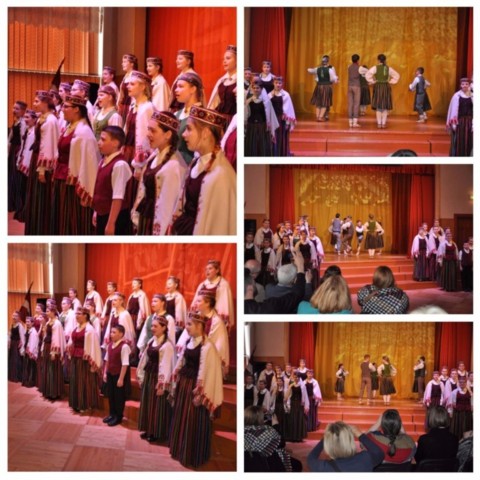
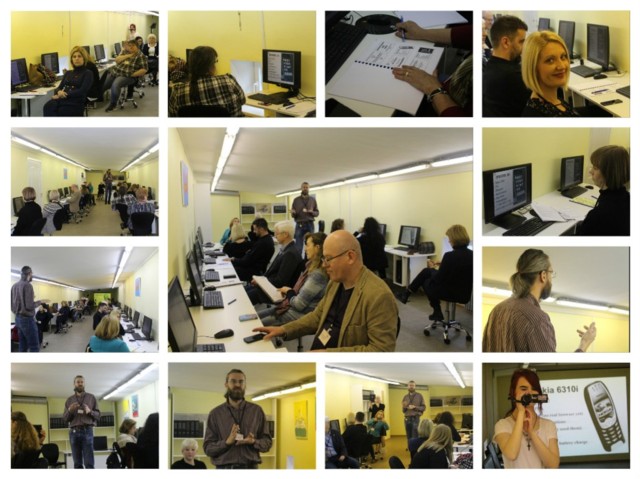
Day 2
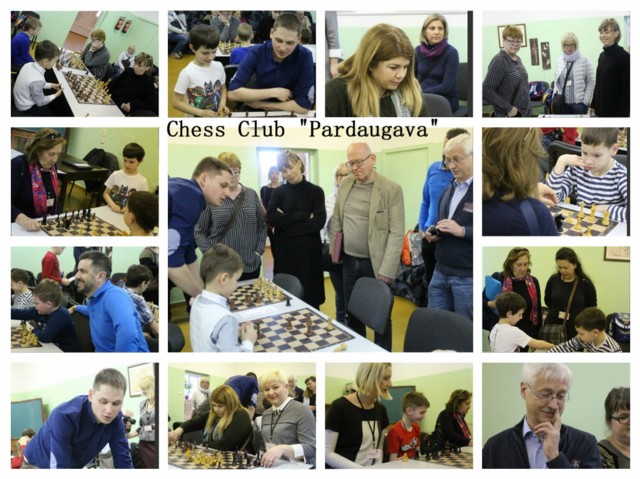




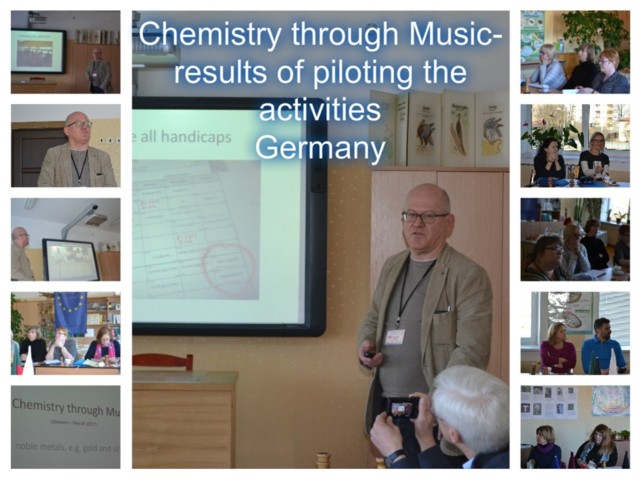
 Study
Visit to Bishumuizha Technical Centre - Ramona
Šmitiņa Study
Visit to Bishumuizha Technical Centre - Ramona
Šmitiņa
 Guided tour around the
institution. Workshop (glass, ceramics)
- Liena Bizūne Guided tour around the
institution. Workshop (glass, ceramics)
- Liena Bizūne
Day 3
Open lessons:
 Science
lesson - Form 1A -
The animal
world of Latvia - Lidija Lazareva Science
lesson - Form 1A -
The animal
world of Latvia - Lidija Lazareva
 Physiotherapy - Form 9B and project members
- Tatjana Zashchirinskaja Physiotherapy - Form 9B and project members
- Tatjana Zashchirinskaja
 English/Social
studies/Geography –Form 8a - Cross curricula lesson - Migration -
Ludmila Renge English/Social
studies/Geography –Form 8a - Cross curricula lesson - Migration -
Ludmila Renge
Sharing
experience. Teaching methods and approaches to work with refugees
(Erika Pičukane,
I.Shinkareva)
3.Concert Piccolo
and Guided tour around Riga Cathedral
4. Reception at
Riga Town Hall .
Welcome words.
Introduction to Education, Culture and Sports Department of Riga City
Council .Guided tour around the Town Hall ( Mayor of Riga N. Ushakovs,
City Council deputy A.Vladova)
5.The Virtual
Flights above Riga and Porto - 5D movie watching and meeting with the
film director .
Day4.
Dissemination of project results and ttraining event: on - line web cam
broadcast
1. How the
school is using the latest technologies to develop teaching methods and
decrease early school leaving – Iceland ( Bryndis Bjarnason,
Guðbjörg Halla Magnadóttir,
Helga Björt
Möller, Sveinfríður Olga Veturliðadóttir)
2. The
German experience in dealing with immigrants’ and low achievers’
problems.
Germany Integration via language training
Germany -
(Astrid
Ebnicher,Carsten
Lampe,Ralph David)
3.
Integration via science lessons( tourism, nature, national heritage) -
Croatia
(Zdenka
Barović,Zvonimir Vuković,Vesela Visić)
4. Academic
support for immigrants in Greek and Math, lessons aiming to develop
students’ motivation, intercultural skills and prevent their early
school leaving. Multiculturalal
activities:
history and culture of participating immigrant students through dances,
music and food and language awareness of the spoken languages through
quizzes and role plays
Cyprus (Christina
Chimaridou,Eva Adamou)
5. Creation
and implementation of innovative ICT tools in Science lessons aiming to
develop students’ motivation and prevent early school leaving(Virtual
maps, presentations, videos, addressing low achievement in basic skills
through more effective teaching math. ) 2.The outcomes of the research
in the Portuguese school : If new technologies have an impact(negative
or positive) on a mobility and integration. - Portugal, (Maria
Nair Fontes,Maria João Rios)
6.
Enhancing
students' tolerance via literary tourism.
Riga
Pardaugava School
shares its experience in using literary tourism (I. Shinkareva, T.
Moisejeva, Y. Chernakova, L.Renge)
  
7.
Conclusion, panel discussions
Day 5
1.Express in -
service training: ICT tools to promote students' learning
motivation(virtual excursions, learning applications for mobiles to
increase students interest and motivation)
2.
Feedback, evaluation
of the outputs and outcomes of the meeting
3. Bus to Jūrmala
Guided tour of Jūrmala
city, the museum of Jūrmala city, walk along Jomas street and the Riga
Gulf seashore, street markets
The results of the
training:
-
the
cooperation between the participants involved in the Project was
strengthened through the collaboration and common activities, group
work
-
new
perspectives regarding to the theme of the Project were gained by
each participant, the vision how to deal with learning of migrant
student and how to create learning application for mobile phones was
acquired by each participant
-
the staff
exchanged views on teaching content, shared their experience, the
results of researches, piloting activities
-
the
participants innovations were dessiminated in face - to - face
situation and on - line
-
the
training in using new ICT tools and innovative methods, aiming to
develop students' interest and motivation was successfully provided
-
teachers
work together in multinational and multidisciplinary groups and so
benefited from special learning and teaching conditions not
available in a single institution
-
The staff
learnt about history and traditions of Latvia
Please describe the
arrangements for recognition or validation of the learning outcomes of
the participants in the learning, teaching or training activities you
organised. Did your project made use of European instruments like
Europass, ECVET, Youthpass, ECTS etc. or any national
instruments/certificates?
All participants received Europass certificates
|
Activity No. |
C1 |
|
|
Field |
School Education |
|
|
Activity Type |
Short - term joint staff
training events |
|
|
Activity Description |
|
|
|
No. of Participants |
40 |
|
Participants with Special
Needs (out of total number of Participants) |
0 |
|
Accompanying Persons (out
of total number of Participants) |
0 |
|
Is this a long - term
activity? |
No |
|
Funded Duration (days) |
5 |
|
Participating
Organisations
Riga Pardaugava school
(Latvia)
Riga Bishumizha Technical
school (Latvia)
StädtischeAdolf -
Reichwein - Gesamtschule (Germany);
Gymnasio Palouriotisisas (Cyprus);
Agrupamento Escola de Gala
Nascente (Portugal);
Osnovna škola Marjan
(Croatia);
Grunnskólinn á Îsafirði
(Iceland) |
|
Additional
information about the dessimination of the project results:
With the aim to
promote the project and to reflect its activities:
• The project web
site was created with the information and presentations from the
meetings and to reflect the progress of the project:
http://erasmus.pdps.lv
All
participant schools reflected the Project events on their schools
websites
• articles were
published in local newspapers (Latvia, Croatia, Germany, Cyprus,
Portugaland Iceland) on the project:
http://erasmus.pdps.lv/_private/text/germanija8.htm
• radio programs
were made on the Latvian radio4
Also,
school parents and students were informed about the progress of the
project both on the school website and E - class and at special
meetings.
On the
30/08/2016 and 30.08.2017. the experience exchange seminars for
teachers were held at Riga Pardaugava school.The same were held in all
partner schools
The TV
programme was shown on Latvian First Baltic channel about the visit of
the project team to Bishumuizha Technical centre and exchange with
international experience in organising of student free time after school
Five
editions of project Newsletters give the overall impression about
project team work and evaluation of activities
A web cam
on - line broadcast disseminated the project results from training event
on 06.04.2017 |

